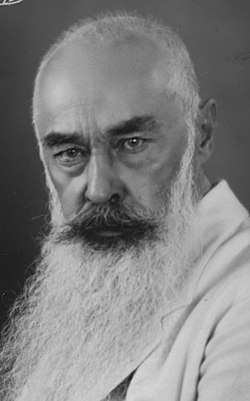Sigurd Wettenhovi-Aspa
| Fiction over fact Pseudohistory |
| How it didn't happen |
Sigurd Wettenhovi-Aspa (born Wetterhoff-Asp[1], 1870–1946) was a Finnish sculptor and painter. However, his artistic works have been completely superseded by his crankery about pseudohistory, pseudoarchaeology and pseudolinguistics.
Specific views[edit]
Many of the beliefs supported by Wettenhovi-Aspa stemmed from his status as a Theosophist.[2]
The Finns were, according to Wettenhovi-Aspa, the primordial nation from which all other nations ultimately derived. However, Finns had not always lived in the Nordics, but instead had travelled from the island of Java and had temporarily settled in Egypt (Äijäkupittaa).[3] There their Finnish language left several words in the local lexicon, such as
- muu mies ("other man") -> muumio ("mummy")[2]
- pyhä raami ("holy frame") -> pyramidi ("pyramid")[2]
- Simpele[note 1] -> Abu Simbel[3]
- seurahepo ("~companion steed") -> seepra ("zebra")[2]
From the mighty Fenno-Egyptian empire civilization would slowly reach the entirety of the world, leaving behind words and proper nouns such as
- kultaura ("gold track") -> kulttuuri ("culture")[2]
- puut ("cut-off wood") -> boat[2]
- Pukinhamina ("Goat's harbor")[note 2] -> Buckingham[3]
- Venesija ("place for boats") -> Venetsia ("Venice")[3]
- se Haaksenperä ("that Haaksenperä") -> Shakespeare[3]
- Parisaaret ("Double Islands" -> Pariisi ("Paris")[3]
- Perälinna ("Fort-in-the-Back") -> Berliini ("Berlin")[4]
The Kalevala,![]() written/compiled by Elias Lönnrot
written/compiled by Elias Lönnrot![]() [note 3] and published in 1835/1849, later to take the position of the national epic of Finland, was characterized by Wettenhovi-Aspa as in fact the oldest book in existence. He claimed that it was an accurate representation of history and even that it was a medical authority.[2]
[note 3] and published in 1835/1849, later to take the position of the national epic of Finland, was characterized by Wettenhovi-Aspa as in fact the oldest book in existence. He claimed that it was an accurate representation of history and even that it was a medical authority.[2]
Wettenhovi-Aspa was in regular correspondence with the Swedish writer August Strindberg,![]() who in turn believed the origin of all languages to be found in Hebrew.[5] He also had a predecessor in the 18th century Finnish bishop Daniel Juslenius
who in turn believed the origin of all languages to be found in Hebrew.[5] He also had a predecessor in the 18th century Finnish bishop Daniel Juslenius![]() who believed Finns to be one of the lost tribes of Israel.[3]
who believed Finns to be one of the lost tribes of Israel.[3]
As time went on, Wettenhovi-Aspa became more and more associated with the extreme right. He served as the head of a prison camp after the Finnish Civil War,![]() supported Adolf Hitler and called people who criticized him Jews.[2][3]
supported Adolf Hitler and called people who criticized him Jews.[2][3]
As an artist[edit]
Wettenhovi-Aspa's merits as an artist are not entirely insignificant. He was educated in Denmark by Peder Severin Krøyer![]() and studied at the Danish Royal Academy of Fine Arts. He also won two medals for his artwork in France in 1895,[1] although his fellow artist Albert Edelfelt
and studied at the Danish Royal Academy of Fine Arts. He also won two medals for his artwork in France in 1895,[1] although his fellow artist Albert Edelfelt![]() [note 4] did characterize his beliefs as "pretty goddamn insane" as early as 1893. Significant trouble assessing his artistic legacy stems from the fact that it is littered all over the world in who-knows-where – not unlike the Finnic influence he claimed, actually.[2]
[note 4] did characterize his beliefs as "pretty goddamn insane" as early as 1893. Significant trouble assessing his artistic legacy stems from the fact that it is littered all over the world in who-knows-where – not unlike the Finnic influence he claimed, actually.[2]
Notes[edit]
- ↑ An actual place by this name exists in Finland.
- ↑ Never mind the fact that it is plainly obvious that the word hamina is an adaptation of the Swedish hamn.
- ↑ Historians still debate how much of each occurred during the creation process.
- ↑ Who is much better known as an artist and is not known to have held significantly cranky beliefs during his lifetime.
References[edit]
- ↑ 1.0 1.1 Wettenhovi-Aspa (ent. Wetterhoff-Asp), Sigurd), Kuvataitelijamatrikkeli (retrieved 28 August 2020)
- ↑ 2.0 2.1 2.2 2.3 2.4 2.5 2.6 2.7 2.8 Suomalaisen huuhaan mestarin hurja teoria: Kaikki kielet pohjautuvat suomeen, Ilta-Sanomat, 30 March 2017 (in Finnish)
- ↑ 3.0 3.1 3.2 3.3 3.4 3.5 3.6 3.7 Jukka Lindfors: Wettenhovi-Aspa ja utopia Suomen mahdista, Yle, 4 January 2011 (in Finnish)
- ↑ Marko Ylitalo: Liian outo nero, Helsingin Sanomat, 26 December 2016 (in Finnish)
- ↑ Tapio Onnela: Pro gradu Sigurd Wettenhovi-Aspan suomen kieltä ja suomalaisten historiaa koskevista näkemyksistä, Agricola – Suomen humanistiverkko, 4 October 2013
